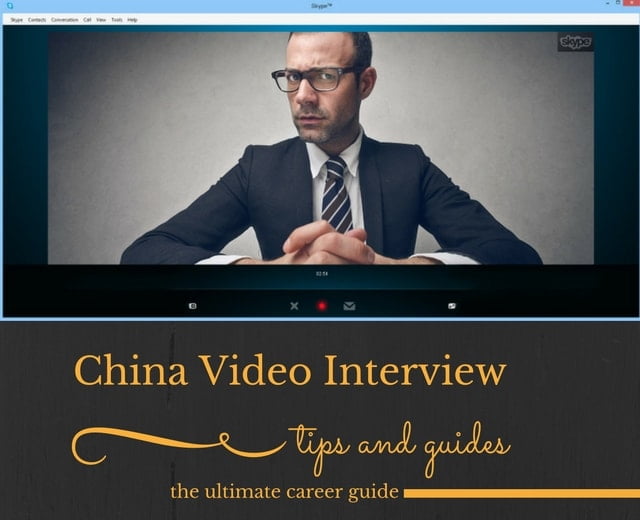Physical Address
304 North Cardinal St.
Dorchester Center, MA 02124
Physical Address
304 North Cardinal St.
Dorchester Center, MA 02124

In order to secure an interview for a Job or Internship in China, you will need to China-proof your CV/ Resume. I carried an article on the anatomy of a Chinese Resume you may consider it. Any prospective employer will tell you that a face to face interview is the single most important factor in the job application process. While a resume and a set of skills might get you somewhere with freelance or remote work, an office environment requires socializing with a variety of personalities, so a good cultural fit is important. Such a character analysis, compatibility, and overall likeability can only be made from a face to face interview—preferably in person. However, when an interviewing for an overseas position, a video interview must suffice to offer a place for a visa.
At CIP, we also coach our China Internship candidates in the interview process and even hold our video interviews before we set you up with a potential employer. Mostly, our “Learn Chinese Language in China” Program participants think interview skills are not relevant but in fact, Most University Language Providers request to speak with them before arrival. When Internship or Chinese language Program, the slots are competitive so you need to nail it!. By doing so, we can ensure that our candidates perform to the best of their abilities in a video interview and present themselves in the best light possible. We asked our team for a summary of tips that will help any candidate in a video interview and compiled them here:
In a video interview, three essentials are important: video, sound, and internet.
For video, candidates will usually use a webcam or a laptop camera, but tablets are also viable options. It’s important to test the quality of the camera (that it’s turned on, for one), and that it’s properly aimed so that your head and upper body are visible (think passport photos). You need to ensure you have good lighting so that your expressions are clearly visible.
For sound, you must have a microphone or headset (if you’re using a desktop). Most laptops have one built in, but you should check before your interview. If you find that your notebook does not have a microphone, look for a hands-free set you use for your cellphone and plug that in for testing. If all else fails, you can use a tablet, or even a cell phone for your interview.
Also, remember to close all your other programs and silence notifications so that there are no pop-ups or “dings” during your interview. Do the same for your phone.
For the internet speed, it really depends on what you have set up at home. Unlike with domestic interviews, you can’t reschedule an interview to coincide with fast internet times (when less people are online in your time zone) as you’ll have to accommodate the time differences between where you are and China. However, you can choose a location with a faster speed (a café or school, for example) and just have a discreet interview in a corner somewhere.
Video interviews, as with any interview, have to be planned beforehand with the time difference taken into account. You’ll have to take note of the timing as perhaps your family or roommate will be present, perhaps it will be dark rather than light outside, and maybe you’ll be too loud and will have to choose a different location.
You should always confirm the time in both your local date and time and the local date and time of the interviewer. Then, it’s wise to confirm a day directly before and then again about fifteen minutes before your scheduled time. So, for example in a Skype interview, you would make sure that you’ve added the interviewer on Skype when you’ve agreed on time, send a confirmation message one day before, and an “I’m ready!” style message a quarter to your interview time.
Perhaps you’ve heard friends bragging about how they interviewed in their boxers or pajama pants via Skype and no one noticed—but that doesn’t mean any one will ever notice. You never know what could happen, so why risk the embarrassment? Dress as you would to any physical interview, comb your hair, and wear the appropriate accessories and makeup if that’s normal for you.
A common mistake candidates make is to stare at the screen, or the interviewer, rather than the camera. For the interviewer, it looks like you’re slouching and that you’re looking down, perhaps even reading something off the screen. If there’s an exercise you need to do, then that’s fine, but most of the time you should maintain eye contact with your video camera.
Remember to inspect your background and see what is visible through the camera: is there a pile of dirty clothes on the floor? Are your teenage idol posters reflecting from the mirror? Try to find a blank background, such as a white wall or door, and avoid windows, mirrors, and other reflective surfaces.
The one benefit of a video interview is the possibility of bringing a “cheat sheet”. Since the interviewer cannot see everything, you could have notes on your screen (but don’t get caught reading), their website open, or notes on the side somewhere that you can easily refer to. You can also prepare a set of questions beforehand and refer to them when prompted.
Remember, to have notes for your interview means you have to do research on the company first!
It’s good to practice your posture (relax your shoulders), where you’ll put your hands, where you should look (and for how long), and which lighting is best. It can be difficult to smile at your electronics, so breathe deeply before your interview, try engaging your interviewer in quick chit chat for a chance to laugh and connect with your interviewer.